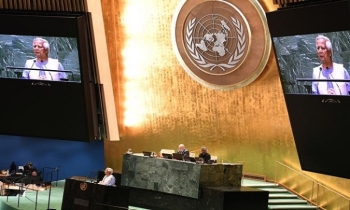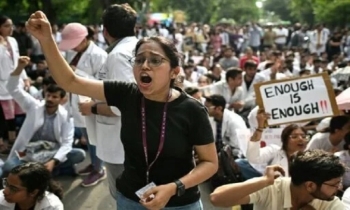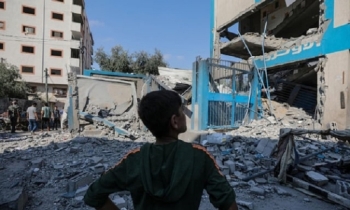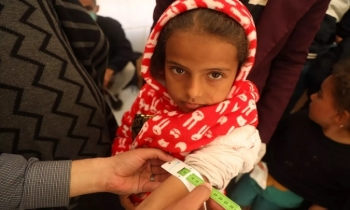78mn children don’t go to school at all, warns UN chief in call for action
BI Report || BusinessInsider
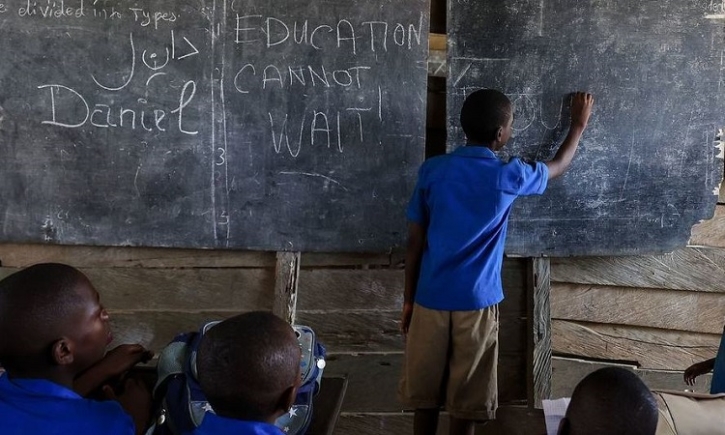
Photo: Collected
A staggering 78 million girls and boys around the world today “don’t go to school at all” because of conflict, climate disasters and displacement – while tens of millions more receive only sporadic teaching UN Secretary-General António Guterres said on Thursday.
Lending his support to a call for more funding for education in emergencies spearheaded by the UN global fund Education Cannot Wait (ECW) the UN chief insisted in a video message that no-one should be denied their chance to learn.
A full 222 million children today experience blighted education today, Mr. Guterres noted. To help them, 18 countries and private partners have pledged $826 million for ECW, on the opening day of the landmark conference.
Education, a fundamental right
“No matter who you are, no matter where you live, no matter what barriers stand in your way, you have a right to a quality education,” he said, in an appeal for greater international efforts to ensure that more vulnerable children and youngsters get their chance to succeed.
Delivering his comments at the Education Cannot Wait High-Level Financing Conference in Geneva, the Secretary-General welcomed the fact that since it was founded in 2017, the fund had trained 87,000 teachers and given seven million children in crisis “the education they deserve”.
As pledges from 18 countries and the private sector topped $826 million on the first day of the conference, UN Special Envoy for Global Education and Chair of ECW’s High-Level Steering Group, Gordon Brown, welcomed the international support for learning for all, as an investment in sustainable peace.
“We are talking about the most isolated, the most desolate, the most neglected children of the world. We’re talking about girls who find themselves trafficked or forced into child labour or child marriage, unless we can help them,” he continued.
Afghanistan: textbook desperation
With her own painful story about education in crisis in Afghanistan, Somaya Faruqi explained that while she had fled the country when the Taliban seized power in August 2021, many of her “sisters” were left behind.
Her girlfriends are now unable to study after being banned from attending class by the de facto authorities, said 20-year-old Faruqi, who remains in contact with them and works as women’s rights activist to highlight their plight.
“The situation is far worse than what you can see in the news and social media,” she told UN News. “Every day I receive messages from my friends that they are forced to marry, regardless of their age or consent.”
Heavy responsibility
She added: “I feel a deep sense of responsibility to support my sisters who are still in Afghanistan. Every day, I stay in touch with them, even though their situation is not good.
“I listen to their stories, offer words of encouragement, and help connect them with resources when I can. It is heartbreaking to see the struggles they face, but it only strengthens my resolve to fight for their rights and to help build a better future for all Afghan women.”
Digital ambition
Faruqi, who is originally from Herat in western Afghanistan, is now studying a mechanical engineering at Missouri University of Science and Technology in the US.
Her interest in fixing things stemmed from helping her father fix cars, which sparked an interest in robotics, as Captain of the Afghan Girls Robotics Team.
Bright future dashed
Together, Faruqi and her team designed and made a low-cost ventilator prototype at the height of the Covid-19 pandemic, in coordination with the Afghan health ministry. Bolstered by that success, Faruqi hopes of pursuing her interest in technology were dashed, when the Taliban swept to power.
“We were going to build the first robotics company in Afghanistan. Unfortunately, when the situation changed,” she said. “Now we can see the actual situation inside Afghanistan, that (the Taliban) do not value what we have and what we had achieved in 20 years.”
Today, Somaya says that she had many happy shared memories of growing up in Afghanistan but feels deeply saddened at how the de facto authorities “took everything from us”.
Through thick and thin
Before the August 2021 coup, “Afghanistan was a place that I called home”, she explained, “where I could pursue my dreams and contribute to the development of my community. However, since the Taliban seized control, the situation has become dire, and my heart aches for the suffering of those who are trapped there.”
Mornings would start happily “with a sense of excitement and purpose, knowing that I would be going to school that day”, Somaya told UN News. “For me, school was not just a place of learning, but a sanctuary where I could be myself, make friends, and dream big. I cherished the opportunity to learn new things, and each day felt like a precious gift.
“But more than that, school was where I made the most meaningful connections of my life - with my girlfriends who shared my passion for knowledge and growth. We laughed together, cried together, and supported each other through thick and thin. Being with them made me feel whole, alive and free.”
“Now, as I look back on those days, my heart swells with gratitude and nostalgia for those precious moments. I know that not all girls have the same opportunities that I did, and it breaks my heart.
“Going to school and spending time with friends should not be a privilege, but a basic right. I will always cherish those memories and work to create a world where every girl has the chance to experience the same magic that I did.”

